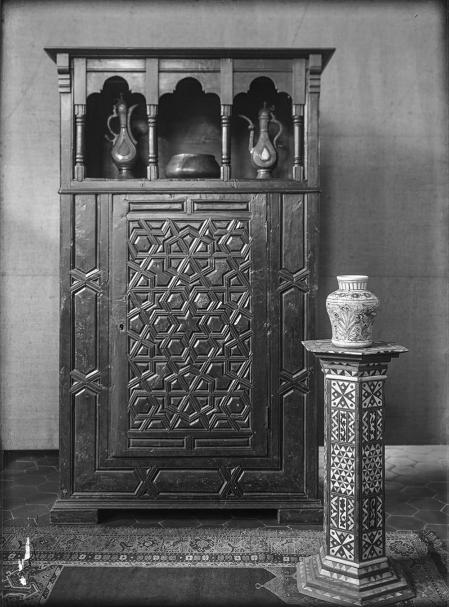24./25. April 2025: Internationales Symposium: Islamische Welten neu denken. Die Folkwang-Idee im Kontext
Tag 2: 10:30–16:30 Uhr
Die Tagung findet auf englischer Sprache statt.
Die Teilnahme an der Tagung ist kostenfrei.
Anmeldung bis zum 20. April 2025 an: symposium@museum-folkwang.essen.de
Alle Informationen zu Program und Ablauf folgen hier in Tagungssprache:
INTERNATIONAL SYMPOSIUM
Revisiting Islamicate Worlds. The Folkwang Concept in Context
Museum Folkwang, 24 + 25 April 2025, Essen
Day 1: 12:00–18:30
Day 2: 10:30–16:30
Organized by Mathilde Heitmann-Taillefer (Museum Folkwang), Nadine Engel (Museum Folkwang) and Eva-Maria Troelenberg (Heinrich-Heine-Universität, Düsseldorf)
The founder and patron of the Folkwang Museum in Hagen, Karl Ernst Osthaus, collected works of art from various genres, styles, periods and regions in the spirit of his art reform movement (also known as the ‘Hagen Impulse’). At the turn of the 20th century, after two long journeys to the Mediterranean region and North Africa, he specifically collected works of ‘Islamic art’. After his early death in 1921, and the sale of his collections in 1922/23, these holdings were transferred to the new Museum Folkwang in Essen together with the art collections. In the course of the reconstruction of the Museum Folkwang after the Second World War, additional works were purchased for the museum, which were assigned to the collection Arts of Islam.
Osthaus had established practices of displaying European and so-called non western art side by side since the museum’s opening in 1902, thus staging an encounter between the arts of different cultures. This practice was continued by Ernst Gosebruch, director of the Museum Folkwang, from 1922 onwards. The current presentation of the collection which has been in place since 2019 is based on this tradition of a ‘school of seeing’.
Against this background, the conference aims to continue an ongoing conversation about the museography and historiography of the Arts of Islam and its musealization, and to develop new insights and questions that are informative for the Essen collection and beyond. The results will be incorporated into the exhibition ‘Karl Ernst Osthaus and the Arts of Islam’ (working title), which will be on show at the Museum Folkwang in 2026.
The international conference will be embedded in a critical examination of terminologies and concepts, including the use and problems of the term ‘Islamic art’ itself. The keynote lecture will be given by Prof. Avinoam Shalem.
In cooperation with
DAY 1
12:00–13:00 | Light lunch and welcome for speakers
13:00–13:10 | Mathilde Heitmann-Taillefer, Museum Folkwang: Welcome
13:15–13:30 | Eva-Maria Troelenberg: Welcome and introduction
13:30–14:30 | Keynote: Avinoam Shalem, Columbia University: Talking about the Arts of Islam in Uncertain Times: The Future of Surfaces (online), Q&A moderated by Mathilde Heitmann-Taillefer
14:30–15:00 | Coffee Break
15:00–16:30 | Panel 1 | The Folkwang Concept
Chair: Lorenz Korn, Universität Bamberg
- Dorina Michaelis, Freelance provenance researcher: Missing in Action: Provenance Research, Evidence Overload and “Lost” Objects of the Folkwang Museum’s Islamic Collection
- Sussan Babaie, Courtauld Institute: Manuscript Travails: Shahnama as Trophy
- Friederike Weis, Heinrich-Heine-Universität, Düsseldorf: ‘The Essence of These Patterns is Sequential Juxtaposition Without End’: the Enthusiasm of Karl Ernst Osthaus for the Islamic ‘Flat Ornament‘
16:30–17:00 | Coffee Break
17:00–18:30 | Panel 2 | The Folkwang Context
Chair: Christin Ruppio, Regionalverband Ruhr
- Christoph Rauch, Staatsbibliothek zu Berlin: The Shahname Manuscript Ms. or. fol. 4251 – Special Circumstances of Acquisition and Provenance Data in the Qalamos Portal
- Yuka Kadoi, Universität Wien: Persian Art through the Eyes of a Modernist: An Alternative Collecting Practice of World Arts, ca. 1900–1925
- Deniz Erduman-Çalış, Museum für Islamische Kunst: Osthaus and his Collection of Islamic Ceramics as Reflected in the Collections of German Museums
- Gisela Helmecke: Islamic Textiles in the Folkwang Museum: Two Late Examples with Arabic Inscriptions
19:30 | Dinner for conference participants
DAY 2
10:30–12:30 | Panel 3 | Museums and the Arts of Islam
Chair: Franziska Koch, Heinrich-Heine-Universität
- Rémi Labrusse, EHESS Paris: Arts in Search of Museums: Islamic Arts and the Crisis of the Museum System in 19th Century Europe
- Francine Giese, Vitrocentre Romont: A Blind Spot in 20th-century Art Historiography: Stucco and Glass Windows and Coloured Light
- Mandana Bender, PhD Ludwig-Maximilians-Universität, München: A Collector's Fortune and an Artist's Eye – The Turco-Persian Illustrations and Manuscripts in the Preetorius Collection
- Miriam Kühn, Museum für Islamische Kunst: Transparent Boundaries: Collecting Islamic Glass Art in the Early 20th Century
12:30–13:30 | Lunch + Coffee
13:30–15:00 | Panel 4 | Transcultural Constellations
Chair: Ilse Sturkenboom, Ludwig-Maximilians-Universität
- Bilal Akkouche, Tate Modern: Rethinking 'Islamic Art' within Tate Modern's Transnational Collecting, Displays and Exhibitions (online)
- Stefanie Bach, Staatliche Kunstsammlungen Dresden: The Damascus Room in Dresden: Perspectives of a Syrian Reception Room
- Anahita Mittertrainer, Museum Fünf Kontinente: „… auch I.K.H. Prinzessin Therese von Bayern hatte einige charakteristische Beispiele der früheren Sevillaner Azulechos geliehen (Nr. 1685).“ Spanish tiles from the collection of Therese von Bayern and Karl Ernst Osthaus at the Museum Fünf Kontinente
15:00–15:30 | Closing discussion
15:30 | End of conference
Programme subject to change.
Teilen auf

